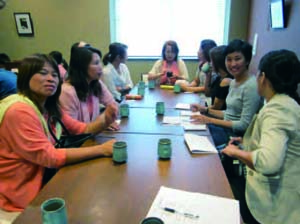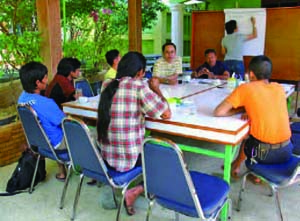Collaborators: Kannapa Pongponrat (Thammasart University, College of Innovation)
HAYAMI, Yoko (Kyoto University, Center for Southeast Asian Studies)
Term:2013-2014
Outline of Research:

Group discussion with Thai women in Ishinomaki
A group of two Japanese and one Thai researcher will examine the extent to which tourism promotion after the 2004 Tsunami disasters in Thailand and 2011 Tsunami
disasters in Japan, respectively, contributed to supporting disadvantaged populations (including foreign residents) in each local area, whether it has been useful, and examine the conditions for such achievement. Cases in Japan will be examined through field work, and the results will be compared with existing research outcomes from Thailand.
In year 2013, we (1) reviewed former research on the topic in relation to cases in Japan, (2) reviewed former research on the topic dealing with cases in Thailand, and (3) conducted pre-research in Japan. In year 2014, we will (1) organize field research in Japan, (2) finalize research outcome as a paper and submit it to an academic journal, and (3) provide research outcomes through presentations in Japan.
Description:

Interview to the Local Residents in Phuket
The purpose of this study is to examine the impact of tourism promotion after the 2004 Tsunami disasters in Thailand and 2011 Tsunami disaster Japan, respectively, on migrant residents who make a living in tourist areas in these countries.
The study is collaborative and aims to bring about more objective and applicable analytical results by comparing two countries with different cultures and backgrounds on the topic of “the effectiveness of tourism promotion in supporting disadvantaged populations in local areas.” Prior studies have been conducted on the relationship between tourism promotion and supporting disadvantaged populations in local areas, but few have carried out a comparison of two countries.
The proposed study is expected to contribute in the following manner to the body of existing knowledge: (1) provide a comparative analysis of the cases of Ishinomaki-shi, Miyagi Prefecture, and Phuket to see to what extent tourism promotion after the Tsunami disasters helped out “the weak” such as migrant residents; (2) present results of the analysis of the conditions under which tourism promotion can help out “the weak”; (3) and add to the literature on the research question “can tourism promotion be beneficial to ‘the weak’ in local areas?” by providing a case study from a new analytical dimension.
